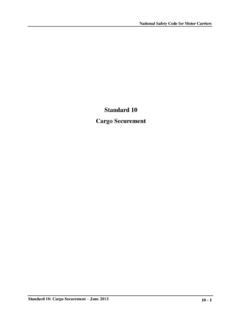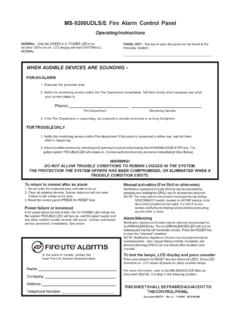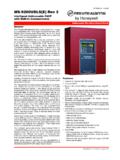Transcription of A REVIEW OF THE CLASSIFICATION OF FARM LOAN …
1 A REVIEW OF THE CLASSIFICATION OF farm loan manager . POSITIONS within THE farm loan PROGRAMS OF USDA/FSA. INTRODUCTION. I have been asked by the law firm of McCallister & Quinn to REVIEW the positions of non- supervisory farm loan manager , GS-12, in the farm Services Agency of USDA, and render an opinion as to the appropriate CLASSIFICATION series and grade for these positions. McCallister & Quinn is acting on behalf of its client, the National Association of Credit Specialists. These positions had been classified using the Agricultural Management Series, GS-0475, a series that required a positive educational requirement for a degree in the biological sciences. On December 21, 1999, the Office of Personnel Management advised USDA. that the GS-0475 series would be abolished, advising that a degree in the biological sciences was unnecessary for satisfactory performance in agricultural loan specialist positions and that the loan Specialist Series, GS-1165 should be used instead.
2 OPM. noted that the GS-1165 series included an agricultural specialization. NOTE: Throughout this paper I will use the organizational title farm loan manager for the GS- 12 non-supervisory positions and the organizational title farm loan Officer for the GS- 11 and below positions rather than the official titles of loan Assistant (GS-5 and GS-7). and loan Specialist (Agricultural). Action to implement OPM's decision and apply the GS-1165 standard to the farm loan positions included a comprehensive study in 2002 and 2003 by the farm Service Agency's personnel office followed an independent REVIEW by a qualified third party contractor. The study and REVIEW concluded that only those farm loan manager positions that supervised three or more persons at a base level of work of GS-11 could properly be classified at the GS-12 level. Other GS-12 specialists who did not meet the requirements for CLASSIFICATION under the GS Supervisory Grade Evaluation Guide were considered to be appropriately classified at the GS-11 level.
3 However, FSA management determined that the existing non-supervisory GS-12's would not be downgraded but rather grandfathered. Instead of being downgraded, the positions they held would be filled at GS-11 when vacated. The National Association of Credit Specialists continues to believe that the non- supervisory farm loan Managers are appropriately classified at the GS-12 level. The Association contends that, even if the determinations made in 2002 and 2003 were correct at the time, changes in the level and complexity since that time warrant reestablishment of the GS-12 level as the appropriate CLASSIFICATION for farm loan Managers. position CLASSIFICATION STANDARDS. Title 5, United States Code, governs the CLASSIFICATION of positions in the Federal Service. This law states that positions shall be classified based on the duties and responsibilities and the qualifications required to do the work. Section 5104 of title 5. provides definitions for the grade levels of the General Schedule.
4 These grade level definitions are the foundation upon which the position CLASSIFICATION standards are built. The CLASSIFICATION of positions recognizes the level and responsibility in terms of the grade levels established by law .. The law requires the Office of Personnel Management to define Federal occupations, establish official position titles, and describe the grades of various levels of work .. OPM approves and issues position CLASSIFICATION standards that must be used by agencies to determine the title, series, and grade of positions covered by title 5. Most occupations change over time, but the fundamental duties, responsibilities required generally remain the same .. (but) Any duties or responsibilities not specifically covered in a standard can still be evaluated by comparison with CLASSIFICATION criteria for similar or related kinds or work. 1. OPM's Introduction to the position CLASSIFICATION Standards also provides a Primary Standard which serves as a standard-for-standards for the Factor Evaluation System (FES).
5 This issuance notes that standards are based on extensive organization studies, to develop criteria which clearly describe the occupation and depict the various levels of difficulty and responsibility so that they can be understood and consistently applied. Although some older standards are written in narrative form, standards developed in recent years use the Factor Evaluation System (FES). The GS-1165 loan Specialist CLASSIFICATION standard is an example of older standards written in narrative form. THE GS-1165 loan SPECIALIST CLASSIFICATION STANDARD. Changes in occupations over time tend to make CLASSIFICATION standards dated as occupations mature, new technology emerges, and the economy develops. For this reason, OPM constantly conducts occupation studies and issues new standards. However, the position CLASSIFICATION Standard for loan Specialist Series, GS-1165, was issued in December 1961 and last modified in June 1966. The series definition contained in the standard continues to apply to the farm loan specialist positions, but the specific examples require extrapolation in order to apply the standard to current agricultural loan work.
6 The 1165 loan Specialist Standard directs that The most significant factors to be considered in the CLASSIFICATION of positions in this series are: 1. Nature of Loans and 2. Nature of Supervision Received. More current position CLASSIFICATION standards using the Factor Evaluation System, classifies positions using an analysis of nine factors: 1. 1. Quoted from The Classifier's Handbook issued by the Office of Personnel Management 2. Knowledge Required by the position , 2. Supervisory Controls, 3. Guidelines, 4. Complexity, 5. Scope and Effect, 6. Personal Contacts, 7. Purpose of Contacts, 8. Physical Demands, and 9. Work Environment. Applying any standard requires the classifier to have or get extensive background information about the relevant Federal programs and detailed information about the position (s) being classified. Even when standards are not directly applicable, the classifier may extrapolate the information in the standard to apply it to the position , compare the positions to positions in different occupational series, and as necessary utilize the Primary Standard contained in the Introduction to position CLASSIFICATION Standards.
7 The guides and standards are no substitute for good In the final analysis the judgment of an experienced classifier is required to assure that a CLASSIFICATION decision applies the correct standard, achieves proper organizational alignment, and provides an appropriate basis for determining the qualifications for the position . Otherwise, the CLASSIFICATION decision will not meet the intent of the CLASSIFICATION Act: to ensure that positions with similar levels of complexity of duties and responsibility and qualifications required to do the work should be classified at the same grade levels. THE position CLASSIFICTION STANDARDS: DIFFERENTIATING BETWEEN. GS-11 AND GS-12 NON-SUPERVISORY loan SPECIALIST POSITIONS. As noted above the position CLASSIFICATION standards for the GS-1165 loan Specialist Series provide that the most significant factors to be considered in the CLASSIFICATION of positions in this series are: 1. Nature of Loans (and). 2. Nature of Supervision Received.
8 The standard describes four other factors considered important for all positions in this series but notes that these factors are reflected in the two principal factors, above, and are not described at the various grade levels of the standard. These four factors include (1). Nature of available guidelines for performance of the work, (2) Nature and scope of recommendations, decisions, commitments, and conclusions, (3) Purpose and nature of person-to-person work relationships, and (4) Qualifications required. Although the GS- 1165 standard is a narrative standard written in an older format, these four supplemental factors could be said to anticipate the development of standards issued in the Factor Evaluation System format. The GS-1165 loan Specialist standard provides general descriptions for non-supervisory positions at the GS-5, GS-7, GS-9, GS-11 and GS-12 positions in four sub- specializations: agricultural, commercial, realty and general. Grade-level descriptions are 2.
9 Adapted from Preface to The Classifiers Handbook, August 1991. 3. generalized to cover all government loan programs and do not specifically cover each specialization. Positions at the GS-5 and GS-7 levels are training and developmental levels and are titled as loan Assistants. GS-9, GS-11, and GS-12 positions are at full performance levels but differ in complexity and nature of the work and degree of supervision received. The official title for these positions is loan Specialist (appropriate specialization). Agencies must use these titles in official personnel documents but also may use organizational (or working) titles. In USDA's farm loan Programs, the commonly used organizational titles are farm loan Officer at the GS-9 and GS-11 levels. At the GS-12 level these positions are known within the organization as farm loan Managers. This paper concerns itself only with determining the correct CLASSIFICATION of the GS- 1165-12 farm loan manager positions that previous studies have determined are properly classified at the GS-11 level.
10 Grade-level definitions within the GS-1165 standard for the GS-11 and GS-12 levels provide examples of work typically performed at these levels. However, none of these examples is specific to the work of loan Specialists (Agricultural). In fairness, many of the cited work processes are typical of those performed by loan specialists across specializations, , the determination of financial capacity of the borrower (as). complicated by the fact that the income is based on the operations of business firms, sometimes with varied activities .. rather than on relatively stable salaries, wages, etc.. Discussing GS-11 level loan Specialist work, the standard states that GS-11. assignments in the realty field are of the complexity represented by analysis of the financial capacity of mortgagors, builders or sponsors who apply for loans or for guarantee or insurance of their commitments in connection with large-scale housing transactions (large multi-family rental projects, operative-builders projects, nursing homes, and the like).





